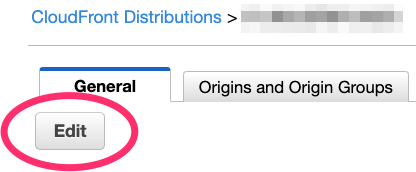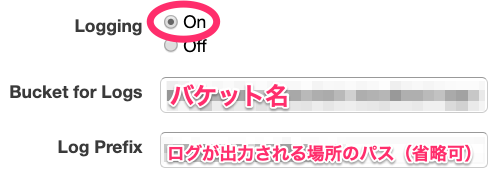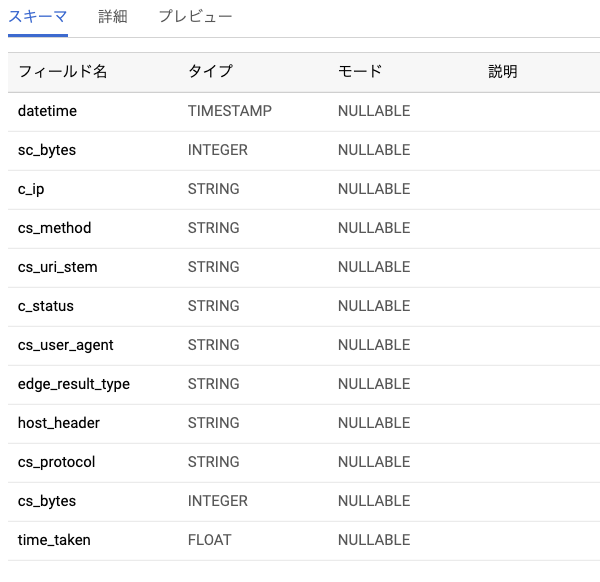背景
いろいろあってCloudFrontのログをAthenaとかでなくBigQueryで分析したかったので試行錯誤した話。
やったこと
CloudFrontでログを取得する
ログを保存するバケットを作成
S3に適当にバケットを作成しておく。
CloudFrontでログ取得の設定
以上の設定をすることで、S3にアクセスログが保存されていく。
ログについての詳細は https://docs.aws.amazon.com/ja_jp/AmazonCloudFront/latest/DeveloperGuide/AccessLogs.html を参照。
EmbulkでS3からBigQueryにログを転送
Embulkの取得
適当なディレクトリを作成しておく
% wget https://dl.embulk.org/embulk-latest.jar
Gemのインストール
EmbulkはJava9以降に対応していないので、Java8を使うように設定しておく。
jenv等々で設定するのも可。
% export JAVA_HOME=$(/System/Library/Frameworks/JavaVM.framework/Versions/A/Commands/java_home -v 1.8)
以下のGemをインストールしておく:
- embulk-input-s3
- embulk-output-bigquery
- embulk-filter-concat
- embulk-filter-column
- embulk-filter-eval
- embulk-filter-timestamp_format
% java -jar embulk-latest.jar gem install \
embulk-input-s3 \
embulk-output-bigquery \
embulk-filter-concat \
embulk-filter-column \
embulk-filter-eval \
embulk-filter-timestamp_format
Config作成
config.yml
in:
type: s3
bucket: [バケット名]
path_prefix: [CloudFrontで設定したプレフィックス][ディストリビューションID].2019-08-29-09 # 適宜変更すること
decoders:
- {type: gzip}
endpoint: s3-ap-northeast-1.amazonaws.com
auth_method: profile # ほかにも認証方法はあるので embulk-input-s3 のドキュメントを参照
profile_name: [AWSのプロファイル名]
parser:
charset: UTF-8
type: csv
delimiter: "\t"
quote: '"'
escape: null
skip_header_lines: 2
columns:
- {name: date, type: string}
- {name: time, type: string}
- {name: edge_location, type: string}
- {name: sc_bytes, type: long}
- {name: c_ip, type: string}
- {name: cs_method, type: string}
- {name: cs_host, type: string}
- {name: cs_uri_stem, type: string}
- {name: c_status, type: string}
- {name: cs_referer, type: string}
- {name: cs_user_agent, type: string}
- {name: cs_uri_query, type: string}
- {name: cs_cookie, type: string}
- {name: edge_result_type, type: string}
- {name: edge_result_id, type: string}
- {name: host_header, type: string}
- {name: cs_protocol, type: string}
- {name: cs_bytes, type: long}
- {name: time_taken, type: double}
# 以降のカラムは不要だったので書いてない
allow_extra_columns: true
filters:
- type: concat # date と time が別のカラムになってるので繋げてから
name: datetime
columns:
- {name: date}
- {name: time}
- type: timestamp_format # string -> timestamp に変換
columns:
- {name: datetime, type: timestamp, from_format: ["%Y-%m-%d %H:%M:%S"]}
timestamp_parser: auto_java
- type: eval
eval_columns:
- cs_user_agent: value.gsub("%2520", " ") # UserAgentのスペースが %2520 として記録されているため
- type: column
columns:
- {name: datetime}
- {name: sc_bytes}
- {name: c_ip}
- {name: cs_method}
- {name: cs_uri_stem}
- {name: c_status}
- {name: cs_user_agent}
- {name: edge_result_type, type: string}
- {name: host_header, type: string}
- {name: cs_protocol, type: string}
- {name: cs_bytes, type: long}
- {name: time_taken, type: double}
out:
type: bigquery
auth_method: authorized_user
json_keyfile: [キーファイルのパス]
project: [GCPのプロジェクト名]
dataset: [BigQuery上のデータセット名]
auto_create_table: true
table: [テーブル名]
mode: append
formatter: {type: csv, charset: UTF-8, delimiter: ',', header_line: false}
path_prefix: /tmp/cloudfront-logs/
file_ext: .csv.gz
encoders:
- {type: gzip}
source_format: CSV
EmbulkでログをBigQueryに投入
% java -jar embulk-latest.jar run config.yml


